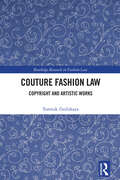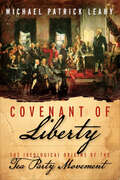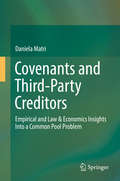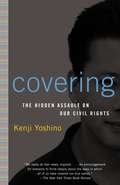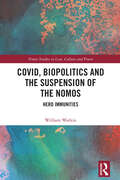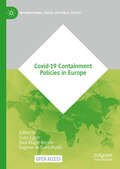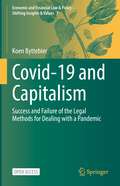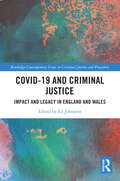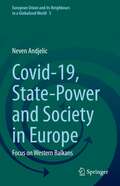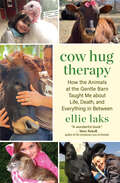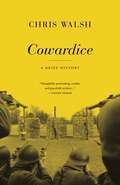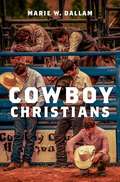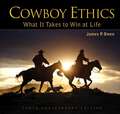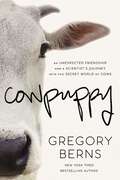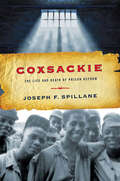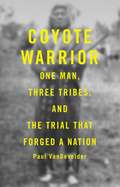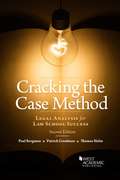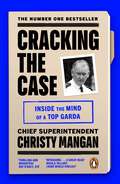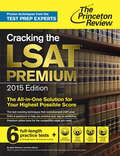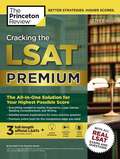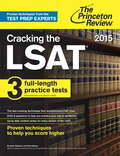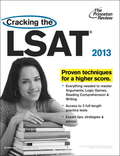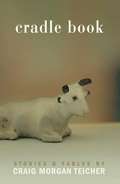- Table View
- List View
Couture Fashion Law: Copyright and Artistic Works (Routledge Research in Fashion Law)
by Tomruk ŰstűnkayaThis book provides an insight into the legal workings of the most ostentatious fashion sector, Couture, whilst simultaneously advocating for stronger legal protection in this industry.Offering an interdisciplinary approach, including art theory from Tolstoy and Rand amongst others, the book examines where Couture fashion sits within the law. Most significantly the book considers the couturier as an ‘artist’ and Couture as ‘art’ in relation to how this art form may be protected legally by copyright. Reflecting on contemporary issues, it analyses recent legal cases together with legislation, to provide awareness on the current position, and considers implications for the future by suggesting legal frameworks in pursuit of improvements. Using U.K. law as a case study, the book also comparatively assesses global fashion law, analysing the legal workings in the E.U. and the U.S.The book will be of interest to researchers in the field of fashion law, copyright law, art, and intellectual property.
Covenant of Liberty: The Ideological Origins of the Tea Party Movement
by Michael Patrick LeahyToday's Tea Party activists are motivated by the same ideological desires as our nation's Founding Fathers, argues Michael Patrick Leahy in this illuminating work of political history.Today's political class—in both parties and at all levels of government—shows a blatant disregard for both the letter and spirit of the U.S. Constitution. More and more Americans are fed up, and from this sweeping sense of discontent and anger the Tea Party movement has emerged, revitalizing the spirit of constitutionalist activism in the conservative world.According to author and Tea Party activist Michael Patrick Leahy, a similar lack of accountability ignited our nation's Founding Fathers, and they were motivated by the same ideological desires: to constitutionally limit government, ensure fiscal responsibility, and defend individual liberty. These imperatives were at the heart of what he calls a "covenant of liberty," which undergirds our written Constitution. Leahy traces these ideas to the libertarian traditions of the English Civil War. He explains why they were on the minds of Americans at the birth of the republic, and how they passed down largely intact from generation to generation, were broken by a corrupted political class, and have been rediscovered by the modern Tea Party movement.According to Leahy, the American constitutional covenant consists of four unwritten promises that most citizens continue to regard as crucial to our government's legitimacy. The story of how this covenant evolved and how its fundamental promises were broken forms the core of this unique and original work of political history.As Leahy shows, the first promise—to abide by the written words of the Constitution—was broken before the ink was dry on the nation's founding documents. The second—to refrain from interfering in private economic matters—was broken by the Republican Party in the 1860s. The third—to honor the customs, traditions, and principles that made up the "fiscal constitution"—was broken by Herbert Hoover 143 years after the establishment of our republic, a sad rupture conducted on an even grander scale by his successors, beginning with Franklin Roosevelt and continuing through the administration of Barack Obama.The breaking of these promises greatly accelerated the natural tendency of governments to centralize and consolidate power at the expense of individual liberty. Had not the fourth and final promise—that members of the legislative branch would exercise thoughtful deliberation while giving respectful consideration to the views of their constituents—been broken in such a disdainful and audacious manner in early 2009, the grassroots activists who came to make up the Tea Party would never have been impelled to take action.Drawing on his personal experience as the organizer of the online conservative community that launched the Tea Party movement in February 2009, Leahy documents how the timeless principles of American constitutionalism have been used to grow one of the most active and influential movements in American history.
Covenants and Third-Party Creditors: Empirical and Law & Economics Insights Into a Common Pool Problem
by Daniela MatriThis book adds to the debate on the effects of covenants on third-party creditors (externalities), which have recently become a focus of discussion in the contexts of bankruptcy law, corporate law and corporate governance. The general thrust of the debate is that negative effects on third-party creditors predominate because banks act in their own self-interest. After systematising the debated potential positive and negative externalities of covenants, the book empirically examines these externalities: It investigates the banks' factual conduct and its effects on third-party creditors in Germany and the US. The study's most significant outcome is that it disproves the assumption that banks disregard third-party creditors' interests. These findings are then interpreted with the tools of economic analysis; particularly, with the concept of common pool resources (CPRs). Around the aggregated value of the debtor company's asset pool (as CPR) exists an n-person prisoner's dilemma between banks and third-party creditors: No creditor knows when and under what conditions the other creditor will appropriate funds from the debtor company's asset pool. This coordination problem is traditionally addressed by means of bankruptcy law and collaterals. However, the incentive structure that surrounds the bilateral private governance system created by covenants and an event of default clause (a CPR private governance system) is found to also be capable of tackling this problem. Moreover, the interaction between the different regulation spheres - bankruptcy law, collateral and the CPR private governance system − has important implications for both the aforementioned discussions as well as the legal treatment of covenants and event of default clauses. Covenants alone cannot be seen as an alternative to institutional regulation; the complete CPR private governance system and its interaction with institutional regulation must also be taken into consideration. In addition, their function must first find more acceptance and respect in the legal treatment of covenants and event of default clauses: The CPR private governance system fills a gap in the regulation of the tragedy of the commons by bankruptcy law and collateral. This has particularly important implications for the German #65533; 138 BGB, #65533; 826 BGB and ad hoc duties to disclose insider information.
Covering the United States Supreme Court in the Digital Age
by Richard DavisThe U. S. Supreme Court seeks to withhold information about its deliberations, while the press's job is to report and disseminate this information. These two objectives conflict and create tension between the justices and the reporters who cover them; add to that the increasing demands for transparency in the digital age and the result is an interesting dynamic between an institution that seeks to preserve its opaqueness and a press corps that demands greater transparency. This volume examines the relationship between justices and the press through chapters that discuss facets such as coverage of the institution, the media's approach to the docket, and the effects of news coverage on public opinion. Additionally, two journalists who cover the court offer insights into the profession of reporting today, while two biographers of Supreme Court justices share the perspectives of those justices regarding the press.
Covering: The Hidden Assault on Our Civil Rights
by Kenji YoshinoIn this remarkable and elegant work, acclaimed Yale Law School professor Kenji Yoshino fuses legal manifesto and poetic memoir to call for a redefinition of civil rights in our law and culture. Everyone covers. To cover is to downplay a disfavored trait so as to blend into the mainstream. Because all of us possess stigmatized attributes, we all encounter pressure to cover in our daily lives. Given its pervasiveness, we may experience this pressure to be a simple fact of social life. Against conventional understanding, Kenji Yoshino argues that the demand to cover can pose a hidden threat to our civil rights. Though we have come to some consensus against penalizing people for differences based on race, sex, sexual orientation, religion, and disability, we still routinely deny equal treatment to people who refuse to downplay differences along these lines. Racial minorities are pressed to "act white" by changing their names, languages, or cultural practices. Women are told to "play like men" at work. Gays are asked not to engage in public displays of same-sex affection. The devout are instructed to minimize expressions of faith, and individuals with disabilities are urged to conceal the paraphernalia that permit them to function. In a wide-ranging analysis, Yoshino demonstrates that American civil rights law has generally ignored the threat posed by these covering demands. With passion and rigor, he shows that the work of civil rights will not be complete until it attends to the harms of coerced conformity. At the same time, Yoshino is responsive to the American exasperation with identity politics, which often seems like an endless parade of groups asking for state and social solicitude. He observes that the ubiquity of the covering demand provides an opportunity to lift civil rights into a higher, more universal register. Since we all experience the covering demand, we can all make common cause around a new civil rights paradigm based on our desire for authenticity-a desire that brings us together rather than driving us apart. Yoshino's argument draws deeply on his personal experiences as a gay Asian American. He follows the Romantics in his belief that if a human life is described with enough particularity, the universal will speak through it. The result is a work that combines one of the most moving memoirs written in years with a landmark manifesto on the civil rights of the future. iven us an important, compelling new way to understand civil rights law, a major accomplishment in itself, but with great bravery and honesty, he has forged his argument from the cauldron of his own experience. In clear, lyrical prose, Covering quite literally brings the law to life. The result is a book about our public and private selves as convincing to the spirit as it is to the mind." -Adam Haslett, author of You Are Not A Stranger Here"Kenji Yoshino's work is often moving and always clarifying. Covering elaborates an original, arresting account of identity and authenticity in American culture."-Anthony Appiah, author of The Ethics of Identity and Laurance S. Rockefeller University Professor Of Philosophy at Princeton University "This stunning book introduces three faces of the remarkable Kenji Yoshino: a writer of poetic beauty; a soul of rare reflectivity and decency; and a brilliant lawyer and scholar, passionately committed to uncovering human rights. Like W.E.B. DuBois's The Souls of Black Folk and Betty Friedan's The Feminine Mystique, this book fearlessly blends gripping narrative with insightful analysis to further the cause of human emancipation. And like those classics, it should explode into America's consciousness."-Harold Hongju Koh Dean, Yale Law School and former Assistant Secretary of State for Human Rights"Covering is a magnificent work - so eloquently and powerfully written I literally could not put it down. Sweeping in breadth, brilliantly argued, and filled with insight, humor, and erudition, it offers a fundamentally new perspective on civil rights and discrimination law. This extr...
Covid, Biopolitics and the Suspension of the Nomos: Herd Immunities (Nomos Studies in Law, Culture and Power)
by William WatkinThis book considers how, during the unprecedented global lockdown due to the Covid-19 pandemic, the normal order of everyday life, of the rule of law, of power itself was interrupted, and hence the nomos of this earth was suspended.Employing the term ‘herd immunity’ from vaccination science and global lockdown policy as a guiding theme, the book considers two central aspects of the pandemic. These are the function of herding and collecting as a definition of ontology after Alain Badiou, and the concept of immunity as a suspension of oppositional differences in the work of Roberto Esposito. It then considers how herd immunity not only disrupts the nomos but also suspends its significance as a guiding principle of state-sanctioned legal norms—and perhaps permanently. Providing critical readings of masking, social distancing, compliance, vulnerability, bubbles, immunity, breathing, anti-vaxxers, nudge theory, cocooning, lockdown, patient zero, and the many other terms that became commonplace between 2020 and 2022, the book traces a suspension of legal and social norms, a manipulation of our compliance using false science, and a reconfiguring of the social nomos, in light of the threats of the virus. In a highly original mix of contemporary and post-war continental philosophy, biopolitical theory, set theoretical mathematics, extensional logic, and the most up-to-date science in the area, it argues that lockdown was not some global, biopolitical power grab, but actually a weakening of power, of nomos.This book will appeal to scholars and others in a range of disciplinary areas with interests in the legacy of Covid; but especially those working in the areas of continental philosophy, contemporary legal theory, and biopolitics.
Covid-19 Containment Policies in Europe (International Series on Public Policy)
by Clara Egger Raul Magni-Berton Eugénie de Saint-PhalleThis open access book examines the diverse strategies implemented by national and local European governments to contain the Covid-19 pandemic. Rather than focus on individual national case studies, it brings together leading scholars and policymakers to analyse the wide range of containment policies utilised across the continent at various levels of government. In doing so, the volume assesses Covid-19 crisis-management experiences to identify good practices based on comparative and fine-grained evidence. It argues that such a stock-taking exercise is crucial to better prepare European polities and societies for future crises, including climate change and environmental disasters. The book will appeal to scholars and students of public policy, crisis-management, public administration, international relations and comparative law.
Covid-19 and Capitalism: Success and Failure of the Legal Methods for Dealing with a Pandemic (Economic and Financial Law & Policy – Shifting Insights & Values #7)
by Koen ByttebierThis open access book provides a comprehensive analysis of the socioeconomic determinants of Covid-19. From the end of 2019 until presently, the world has been ravaged by the Covid-19 pandemic. Although the cause of this is (obviously) a virus, the extent to which this virus spread, and therefore the number of infections and deaths, was largely determined by socio-economic factors. From this, it follows that the course of the pandemic varies greatly from one country to another. This observation applies both to countries’ resilience to such a pandemic (which is mainly rooted in the period preceding the outbreak of the virus) and to the way in which countries have reacted to the virus (including the political choices on how to respond). Meanwhile, research has made it clear that the nature of this response (e.g., elimination policy, mitigation policy, and proceeding herd immunity) was, on the one hand, strongly determined by political and ideological factors and, on the other hand, was highly influential in the factors of success or failure in combating the pandemic.The book focuses on the situation in a number of Western regions (notably the USA, the UK, and the EU and its Member States). The author addresses the reasons why in many Western countries both pandemic prevention and response policies to Covid-19 have failed. The book concludes with recommendations concerning the rearrangement of the socio-economic order that could increase the resilience of (Western) societies against such pandemics.
Covid-19 and Criminal Justice: Impact and Legacy in England and Wales (Routledge Contemporary Issues in Criminal Justice and Procedure)
by Ed JohnstonThis collection presents a unique and diverse range of contributions on challenges faced by criminal justice in England and Wales in the wake of the Covid-19 global pandemic. The book brings together leading experts to examine the impact of the pandemic on policing and criminal procedure, prisons and the post-conviction stage of the system. The work further explores the lessons that may be learned and explores the relevance of these lessons for the wider criminal justice system. The reader will gain substantial insight into contemporary challenges in these areas, through original analysis and argument. The experience of England and Wales during the pandemic will also be of interest to the wider international community who will have encountered many of the issues raised in this collection. The book will be essential reading for researchers, academics and policy-makers involved in criminal justice.
Covid-19 and Insurance (AIDA Europe Research Series on Insurance Law and Regulation #7)
by María Luisa Muñoz Paredes Anna TarasiukThis book offers a novel study on the impact of the Covid-19 pandemic on insurance from an international and comparative perspective. It assesses how insurance has to adapt to a new landscape, the effects of which will last over time and cut across all areas of the field. To avoid physical contact, digitalisation has accelerated dramatically, affecting insurance in all its phases: risk selection, underwriting, pricing and claims settlement. However, the effects of the Covid-19 pandemic go far beyond that. The extent to which a claim caused directly or indirectly by the virus is or is not covered by a given policy has been the subject of debate in many insurance branches. The most litigated cases worldwide are those that concern damages resulting from business interruption due to restrictions enforced by the authorities in virtually every country. This book analyses the rulings (for and against the insured) that have already been handed down by courts in various jurisdictions (for example in the US, Latin America, Spain and Germany), in order to provide guidance to the parties in future lawsuits and also to guide the courts’ own responses. This analysis extends to the measures that governments have taken in relation to insurance during the pandemic, as well as the changes that insurers have introduced in their general conditions to exclude coverage for the pandemic. This response is unsatisfactory, as the big question is how pandemic-related risks can be covered if private insurers simply refuse to do so. Solutions based on risk sharing with public entities or the use of contractual modalities such as parametric insurance are among those outlined by the authors. The book was written by experts from academia and lawyers specialising in this field, and written for all those interested in the field of insurance: lawyers, judges, academics and legal professionals.
Covid-19, State-Power and Society in Europe: Focus on Western Balkans (European Union and its Neighbours in a Globalized World #5)
by Neven AndjelicThis book explores the current state of society in Europe in general and the regimes and societies of the Western Balkans in particular. The pandemic and near-universal lockdown have provided an ideal cut-off date for the collection of indices from reputable academic sources that cover the nature of these regimes, individual human freedoms, economic freedoms, the rule of law, human rights and media freedoms. The aggregated findings from the 20 individual indices provide comprehensive data to support original findings and the characterisation of societies in 45 European states. Admittedly, there are differences in the methodologies and samples among the indices consulted. Nonetheless, taken together they offer a solid basis for developing arguments concerning the diversity of regimes, governance and societies in Europe and drawing well-founded conclusions on the nature of society in various parts of Europe. Though the book’s main focus is on the Western Balkans, the region is put in a pan-European context. The issues of migration, minorities, global geopolitics, the crisis of liberal democracy – they all play into developments that are specific to the Western Balkans. The book answers the question of whether the pandemic has allowed local regimes to strengthen their power and exert greater control over society, making it possible to formulate arguments regarding the future of Europe and its integrative processes. In closing, the book investigates Western Balkan regimes’ reactions to the pandemic in the context of governance, society and state power, before addressing the question of whether the future of the Western Balkans lies in the “liberal club”, or whether local hybrid regimes will become even more influential in the near future.
Cow Hug Therapy: How the Animals at the Gentle Barn Taught Me about Life, Death, and Everything in Between
by Ellie LaksThe inspirational story of the compassionate and wise animals of the Gentle Barn and how they became a therapeutic salve for countless guests — and mentors for all of us in how to live and die In Cow Hug Therapy, Ellie Laks recounts the extraordinary journey that started with her first teacher, Buddha — not the religious figure, but a rescued miniature Hereford cow. One evening Buddha wrapped her neck around an exhausted and upset Ellie and transferred a singular form of healing and comfort with an incredible impact. Understanding that this was something to be shared with others, Ellie developed Cow Hug Therapy, a groundbreaking approach to emotional healing that has proved effective for trauma, illness, disabilities, addiction, grief, and stress. This colorful and compelling narrative introduces the healing mavens of the barnyard, each with a unique story of being rescued from trauma and treated with love and respect. In their new role at Ellie’s Gentle Barn sanctuaries, these animals have transformed lives and ignited breakthroughs and newfound purpose for visitors including a young mother who lost her baby, a suicidal teenager, a wounded serviceman, an open-heart-surgery patient, and many more. A testament to empathy and the mission to heal animals, people, and the planet, Cow Hug Therapy serves as a beacon of hope for all seeking healing and connection.
Cowardice: A Brief History
by Chris WalshA provocative look at how cowardice has been understood from ancient times to the presentCoward. It's a grave insult, likely to provoke anger, shame, even violence. But what exactly is cowardice? When terrorists are called cowards, does it mean the same as when the term is applied to soldiers? And what, if anything, does cowardice have to do with the rest of us? Bringing together sources from court-martial cases to literary and film classics such as Dante's Inferno, The Red Badge of Courage, and The Thin Red Line, Cowardice recounts the great harm that both cowards and the fear of seeming cowardly have done, and traces the idea of cowardice’s power to its evolutionary roots. But Chris Walsh also shows that this power has faded, most dramatically on the battlefield. Misconduct that earlier might have been punished as cowardice has more recently often been treated medically, as an adverse reaction to trauma, and Walsh explores a parallel therapeutic shift that reaches beyond war, into the realms of politics, crime, philosophy, religion, and love.Yet, as Walsh indicates, the therapeutic has not altogether triumphed—contempt for cowardice endures, and he argues that such contempt can be a good thing. Courage attracts much more of our attention, but rigorously understanding cowardice may be more morally useful, for it requires us to think critically about our duties and our fears, and it helps us to act ethically when fear and duty conflict.Richly illustrated and filled with fascinating stories and insights, Cowardice is the first sustained analysis of a neglected but profound and pervasive feature of human experience.
Cowboy Christians
by Marie W. DallamCowboy Christians examines the long history of cowboy Christianity in the American West, with a focus on the present-day cowboy church movement. Based on five years of historical and sociological fieldwork in cowboy Christian communities, this book draws on interviews with leaders of cowboy churches, traveling rodeo ministries, and chaplains who serve horse racing and bull riding communities, along with the author's first-hand experiences as a participant observer. <P><P> Marie W. Dallam traces cowboy Christianity from the postbellum period into the twenty-first century, looking at religious life among cowboys on the range as well as its representation in popular imagery and the media. She examines the structure, theology, and perpetuation of the modern cowboy church, and speculates on future challenges the institution may face, such as the relegation of women to subordinate participant roles at a time of increasing gender equality in the larger society. She also explores the cowboy Christian proclivity for blending the secular and the sacred in leisure environments like arenas, racetracks, and rodeos. Dallam locates the modern cowboy church as a descendant of the muscular Christianity movement, the Jesus movement, and new paradigm church methodology. Cowboy Christians establishes the religious significance of the cowboy church movement, particularly relative to twenty-first-century evangelical Protestantism, and contributes to a deeper understanding of the unique Christianity of the American West.
Cowboy Ethics: What It Takes to Win at Life
by James P. OwenA new approach to business ethics is quietly taking hold in executive suites and corporate boardrooms across America. Frustrated by an epidemic of misbehavior at all employee levels, management teams are getting back to basics-back to the idea that personal character and individual responsibility are the ultimate keys to integrity, just as they were back in the days of the Open Range.A decade ago, the book Cowboy Ethics first inspired businesspeople to look to the Code of the West. Once they did, they discovered that its simple, common-sense principles can be more effective guides to business leadership than a truckload of corporate mission statements, rules, and ethics manuals. "Cowboys are role models because they live by a code," says author James P. Owen. "They show us what it means to stand for something, and to strive every day to make your actions line up with your beliefs. And isn't that as good a definition of integrity as you can find?" In the years since, the book's "Ten Principles to Live By" have been embraced by scores of companies, universities, and even a state government. This updated Tenth Anniversary hardcover edition traces the evolution of this grassroots business movement in brand-new chapters while preserving the inspirational lessons and stunning photography of the original. It's ideal for corporate gifts, the new graduate, business students, or any career person who cares about doing the right thing.
Cowpuppy: An Unexpected Friendship and a Scientist’s Journey into the Secret World of Cows
by Gregory BernsFrom the author of the bestselling How Dogs Love Us, a fascinating glimpse into the cognitive and emotional lives of cows.When Emory University neuroscientist Gregory Berns and his wife decided to venture into sustainable farming in rural Georgia, they knew that cows were a key part of a successful operation. But that was where his knowledge of cattle ended.As Berns and his small herd of three miniature zebus acclimated to each other and Berns received a crash course in being a cattleman, he turned his powers of scientific observation and innovation on his new charges. This wasn&’t the first time he&’d studied animals through the lens of neuroscience; years earlier, Berns had applied his knowledge to man&’s best friend, resulting in two books and important advances in how we understand dogs&’ thoughts and emotions. Now it was time to see what he—and all of us—could discover about the interior worlds of cows.In this moving and captivating memoir, Berns weaves together his hands-on experiences with his growing herd, accessible scientific explanations of animal behavior, and evocative portraits of the animals at the center of his study: the original bull, Ricky Bobby; the two mamas, Lucy and Ethel; and their sweet and spirited calves: BB, Cricket, Princess Xena, Luna, Walker, and Texas Ranger.Whether cows are a familiar part of your experience or you&’re a city dweller longing for life in the country, Cowpuppy offers a deeper understanding of these complex creatures and what we humans can learn from them.
Coxsackie: The Life and Death of Prison Reform (Reconfiguring American Political History)
by Joseph F. SpillaneHow progressive good intentions failed at Coxsackie, once a model New York State prison for youth offenders.Should prisons attempt reform and uplift inmates or, by means of principled punishment, deter them from further wrongdoing? This debate has raged in Western Europe and in the United States at least since the late eighteenth century. Joseph F. Spillane examines the failure of progressive reform in New York State by focusing on Coxsackie, a New Deal reformatory built for young male offenders. Opened in 1935 to serve "adolescents adrift," Coxsackie instead became an unstable and brutalizing prison. From the start, the liberal impulse underpinning the prison’s mission was overwhelmed by challenges it was unequipped or unwilling to face—drugs, gangs, and racial conflict.Spillane draws on detailed prison records to reconstruct a life behind bars in which "ungovernable" young men posed constant challenges to racial and cultural order. The New Deal order of the prison was unstable from the start; the politics of punishment quickly became the politics of race and social exclusion, and efforts to save liberal reform in postwar New York only deepened its failures. In 1977, inmates took hostages to focus attention on their grievances. The result was stricter discipline and an end to any pretense that Coxsackie was a reform institution.Why did the prison fail? For answers, Spillane immerses readers in the changing culture and racial makeup of the U.S. prison system and borrows from studies of colonial prisons, which emblematized efforts by an exploitative regime to impose cultural and racial restraint on others.In today’s era of mass incarceration, prisons have become conflict-ridden warehouses and powerful symbols of racism and inequality. This account challenges the conventional wisdom that America’s prison crisis is of comparatively recent vintage, showing instead how a racial and punitive system of control emerged from the ashes of a progressive ideal.
Coyote Warrior: One Man, Three Tribes, and the Trial That Forged a Nation
by Paul VandevelerA look at the complex issue of Indian law as it's being molded by a new generation of Native American lawyers, called coyote warriors, who are part of the Indigenous Environmental Network.
Cracking The Case Method, Legal Analysis For Law School Success (Career Guides)
by Paul Bergman Patrick Goodman Thomas HolmFor about 150 years, law schools have relied on the Case Method to teach the skills and art of legal analysis to first-year law students. Yet many students struggle academically, not due to lack of intellectual ability but because they are suddenly immersed in a unique and seemingly opaque educational process without receiving any explanation of what they should be trying to learn, much less how to learn it. Why do reading assignments consist of appellate court opinions? Why do professors rely on the Socratic Method? Why do law school classes so often leave students with more questions than answers? What do instructors look for when grading answers to essay exams? Why can law students know "all the rules," yet get poor grades? <p><p> Cracking the Case Method, 2d ed., provides concise and down-to-earth information on how to succeed in law school by answering these questions and many others. Students need to know what to study and how the opinions they read and class meetings relate to law school exams. <p> An approach for analyzing exam questions and writing effective exam answers that display legal analytical skills, with illustrations drawn from actual essay exam questions and annotated answers. This book provides indispensable information to anybody who is considering applying to law school, preparing for his or her 1L year, or who currently is in law school.
Cracking the Case: Inside the mind of a top garda
by Christy ManganThe No. 1 bestselling story of one of Ireland's top homicide investigators 'Thrilling and insightful' Ray D'Arcy, RTÉ 'Intriguing . . . a great read . . . it's the story of Ireland in a way' Nicola Tallant'Important and compassionate' Irish Times* * *'A fascinating, deeply personal journey inside of some of the most high-profile and grotesque crimes of the past four decades . . . a rare insight into the darkest recess of human nature' Paul Williams, Irish IndependentAfter a forty-year career in the gardaí Christy Mangan knows how hard it is to solve a murder. Now, in Cracking the Case, he takes a deep dive into how investigations are run.The book includes infamous and iconic cases such as that of Fr Niall Molloy whose violent death after a high society wedding became a source of feverish conspiracy theories; the notorious 'Scissor Sisters' case in which two sisters killed and dismembered their mother's abusive lover; and the tragic murder of teenager, Keane Mulready-Woods, as part of a gangland turf war in Drogheda.In these and other fascinating stories, Mangan details the care investigators take in trying to give victims' families answers and to see justice done. He also shows a deep understanding of the complex reasons people are drawn into crime or commit unthinkable acts.Cracking the Case is a remarkable insight into the mind of a gifted garda working at the highest level.Christy Mangan retired at the rank of chief superintendent in 2022.* * *'The people who most ought to read it are the country's lawmakers and the top rank of An Garda Síochána' Irish Times 'Lots of fascinating stories' Matt Cooper, Today FM 'Compelling' RTÉ Guide
Cracking the LSAT Premium Edition with 6 Practice Tests, 2015
by Princeton ReviewTHE ALL-IN-ONE SOLUTION FOR YOUR HIGHEST POSSIBLE SCORE!<P> Get all the prep you need to ace the LSAT with The Princeton Review, including 6 full-length practice tests, thorough topic reviews, and exclusive access to our online Premium Portal with tons of extra practice and resources. This eBook edition has been optimized for on-screen viewing with cross-linked questions, answers, and explanations.Techniques That Actually Work. * Powerful strategies for tackling each section of the exam* Key tactics for cracking tough Games question sets* Tips for pacing yourself and prioritizing challenging questions Everything You Need To Know for a High Score.* Logical and Analytical Reasoning questions, many based on actual exams (with the permission of the Law School Admission Council)* Expert instruction and lessons for each LSAT sectionPractice Your Way to Perfection.* 2 full-length practice tests with detailed answer explanations* 4 additional full-length LSAT practice exams online* Drills for each area, including Reading Comprehension and WritingPlus, with Cracking the LSAT, Premium Edition you'll get online access to our exclusive Premium Portal for an extra competitive edge:* Video tutorials with expert advice from leading course instructors* Multi-week study plan guides* Law school profiles, admission guides, and essay tips* Special "LSAT Insider" bonus section packed with information about the admissions landscape, legal job market, law school rankings and ratings, and more<P> Advisory: Bookshare has learned that this book offers only partial accessibility. We have kept it in the collection because it is useful for some of our members. To explore further access options with us, please contact us through the Book Quality link on the right sidebar. Benetech is actively working on projects to improve accessibility issues such as these.
Cracking the LSAT Premium: The All-in-One Solution for Your Highest Possible Score (Graduate School Test Preparation)
by Princeton Review Staff<p>Get all the prep you need to ace the Law School Admission Test with this guidebook, including 3 official LSAT PrepTests, targeted strategies for each test section, and Premium Portal extras online. <p>Everything You Need to Know to Help Achieve a High Score. <li>Instructional material and step-by-step examples that all use real, previously-administered LSAT problems <li>Thorough coverage of all LSAT topics, including Arguments, Logic Games, Reading Comprehension, and Writing <li>Expert instruction and targeted strategies for each LSAT section</li> <p> <p>Practice That Takes You to Excellence. <li>3 full-length, recent LSAT PrepTests (licensed directly from the Law School Admissions Council)--all accessible online and accompanied by detailed answer explanations <li>Over 100 additional real LSAT questions in the book as practice drills <li>Personalized score reports with in-depth analysis for each test available online</li> <p> <p>Techniques That Actually Work--Plus Online Extras for a Competitive Edge <li>Tried-and-true strategies to help you avoid traps and beat the test <li>Complete breakdown of common LSAT mistakes <li>Essential tactics to help you work smarter, not harder <li>Multi-week study guides <li>Law school profiles, admission guides, and essay tips</li> </p>
Cracking the LSAT with 3 Practice Tests, 2015 Edition
by Princeton ReviewTHE PRINCETON REVIEW GETS RESULTS. Get all the prep you need to ace the LSAT with 3 full-length practice tests, thorough LSAT section reviews, and extra practice online.This eBook edition has been specially formatted for on-screen viewing with cross-linked questions, answers, and explanations.Techniques That Actually Work. * Powerful strategies for tackling each section of the exam* Key tactics for cracking tough Games question sets* Tips for pacing yourself and prioritizing challenging questions Everything You Need To Know for a High Score.* Logical and Analytical Reasoning questions, many based on actual exams (with the permission of the Law School Admission Council)* Expert instruction and lessons for each LSAT sectionPractice Your Way to Perfection.* 2 full-length practice tests with detailed answer explanations* 1 additional full-length LSAT practice exam online* Drills for each area, including Reading Comprehension and Writing<P> Advisory: Bookshare has learned that this book offers only partial accessibility. We have kept it in the collection because it is useful for some of our members. To explore further access options with us, please contact us through the Book Quality link on the right sidebar. Benetech is actively working on projects to improve accessibility issues such as these.
Cracking the LSAT, 2013 Edition
by Princeton ReviewIf you need to know, it's in this book! Cracking the LSAT, 2013 Edition includes everything you need to know to master the Arguments, Logic Games, Reading Comprehension, and Writing sections of the exam. With all questions and answers cross-linked for easy on-screen viewing, this ebook edition includes: * Access to 3 full-length practice exams * Tons of drills and detailed explanations to show you exactly what to expect on the LSAT * A thorough review of all LSAT topics, including Logic Games techniques * Key LSAT strategies and a breakdown of common LSAT mistakes * Expert tips, hints, and advice
Cradle Book
by Craig Morgan TeicherTimeless yet timely and hopeful with a dark underbelly, these fables revive a tradition running from Aesop to W.S. Merwin. With a poet's mastery, Craig Morgan Teicher creates strange worlds populated by animals fated for disaster and the people who interact with them, or simply act like them, including a very sad boy who wishes he had been raised by wolves. There are also a handful of badly behaving gods, a talking tree, and a shape-shifting room.Craig Morgan Teicher is poetry editor of Publishers Weekly and a vice president on the board of the National Book Critics Circle. He lives in Brooklyn, New York.
